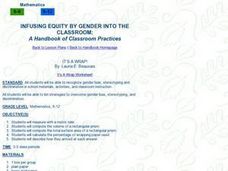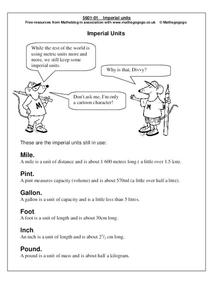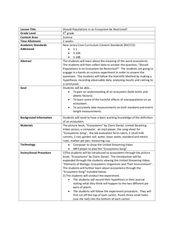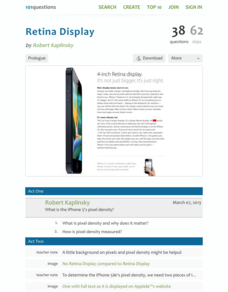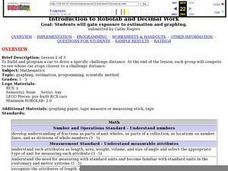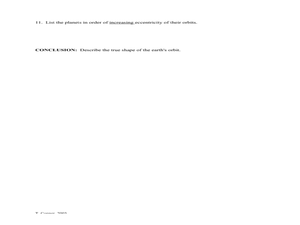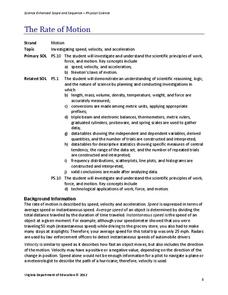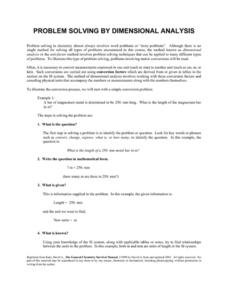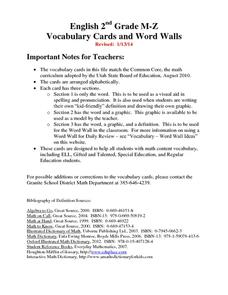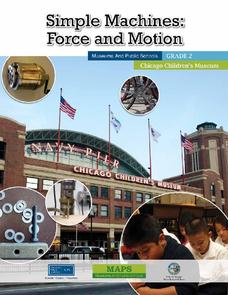Curated OER
Mathematics: It's a Wrap!
Students calculate the amount of wrapping paper needed to wrap boxes. They describe how they determined their answers.
Curated OER
Imperial Units
In this imperial units instructional activity, students read the definitions to the following list of imperial units: mile, pint, gallon, foot, inch and pound.
Curated OER
Should Populations in an Ecosystem be Restricted?
Fourth graders experiment to determine how overpopulation effects ecosystems specifically plants. In this ecosystem lesson, 4th graders conduct an ecosystems experiment after listening to Claire Daniel's, Ecosystems. They watch a video,...
101 Questions
Retina Display
Learners calculate the pixel density of a specific cell phone using the concept of similarity. They use information from the cell phone's website to make their calculations and then compare their results to the posted information.
Curated OER
THAT'S WHY THEY CALL IT SPACE
Ninth graders set up a scale model of the solar system using the same scale for distance and diameter. They calculate scale distances and sizes for modeling the solar system and relate actual distances to difficulties in discovering and...
Curated OER
Classroom Olympics
Here is a an awesome, 17-page lesson plan on a simulated Olympic Games for your young athletes. After learning about the history of the Olympics, the whole class takes part in events such as The Cotton Ball Shot Put, The Paper Plate...
Virginia Department of Education
The Particle Theory of Matter
Demonstrate the particle theory of matter to high school scientists with an engaging experiment that allows them to visually see the results as substances change from one state to another. The class concludes with a discussion about how...
Cherry Creek Schools
Physical Science Final Exam Review Packet
If you need a way to assess the concepts in your physical science class, use an extended set of worksheets as a midterm or final exam. It includes questions about density, physical and chemical matter, speed and velocity, weight and...
Curated OER
Busted Bubbles
Using the scientific method, and bubble gum, learners conduct a motivating experiment. After conducting a series of tests involving bubble gum, they graph and analyze their results. This is the type of activity everyone loves.
Curated OER
Go The Distance Car Construction
Students build and program a car to drive a specific challenge distance.They must at the end of the instructional activity, have the car that stops the closest to a challenge distance.
Exploratorium
Resonator
Construct a demonstration apparatus for your lesson on resonance. Instructions are provided here to assemble dowels and balls into swinging objects that have different frequencies. It is a neat visual to include during your lecture if...
Curated OER
Baseball Proportion: Student Worksheet
Here is a simple and clever activity which illustrates the concept of mathematical proportion and size quite effectively. In it, two pupils hold baseball bats: one is a regulation-size bat, the other is a miniature souvenir bat. The...
Curated OER
Ellipse Lab
Leading the students to draw a representation of ellipses of planets, this handout will help understanding the planet movement around the sun. There are ten questions about the analysis of those orbits and a conclusino specifically...
Curated OER
It's About Time!
Students examine concept of time, and explore difference between analog and digital clocks; students make art project to represent time and create a time-story problem and solution.
Virginia Department of Education
The Rate of Motion
How much time does it take to jump over three balloons? Pupils calculate the speed of tasks that require different motions. They determine motions for tasks such as walking, skipping, hopping, and jumping before creating a spreadsheet...
Chymist
Problem Solving by Dimensional Analysis
Is your class in another dimension with regards to dimensional analysis? Give them some extra practice with a straightforward activity. Learners convert units by following concise step-wise examples, including setting up the problems....
Curated OER
Vocabulary Cards 2nd Grade M-Z
Math vocabulary has never been easier to understand! Use vocabulary cards to bring word walls to your classroom, helping kids make the connection between important math terms and easy-to-understand illustrations.
Virginia Department of Education
Heat and Thermal Energy Transfer
How does radiation affect our daily lives? Answer that question and others with a lesson that discusses radiation and its use in thermal energy transfer through electromagnetic waves. Pupils investigate vaporization and evaporation while...
Curated OER
Water Pressure Blaster
Third graders complete an experiment to introduce them to the concept of water pressure. In this water pressure lesson plan, 3rd graders create pressure in a water bottle and observe the force of water that is created.
Chicago Children's Museum
Simple Machines: Force and Motion
Get things moving with this elementary science unit on simple machines. Through a series of nine lessons including teacher demonstrations, hands-on activities, and science experiments, young scientists learn about forces, motion, and...
Curated OER
Circuit Diagrams: Switching Circuits
Use a lab sheet on circuit diagrams in your electricity unit. Fifth graders draw two series circuits with diagrams, based on two examples. A science experiment prompts learners to use 3x5 cards to illustrate the way a series circuit works.
Virginia Department of Education
Work and Power
Assist your class with correctly calculating the values for force, work, and power as they determine the amount various activities require. They gather data and participate in a group discussion to compare results upon conclusion of the...
Virginia Department of Education
States and Forms of Energy
Energy is just energy, right? Explain various forms of energy to your young scientists by using an interactive experiment that contains common objects to demonstrate complex concepts. Pupils conduct experiments for radiant, thermal,...
Curated OER
Introduction to the Scientific Method
Young scholars designs and conduct a scientific experiment that identifies the problem, distinguishes manipulated, responding and controlled variables, collects, analyzes and communicates data, and makes valid inferences and conclusions.


